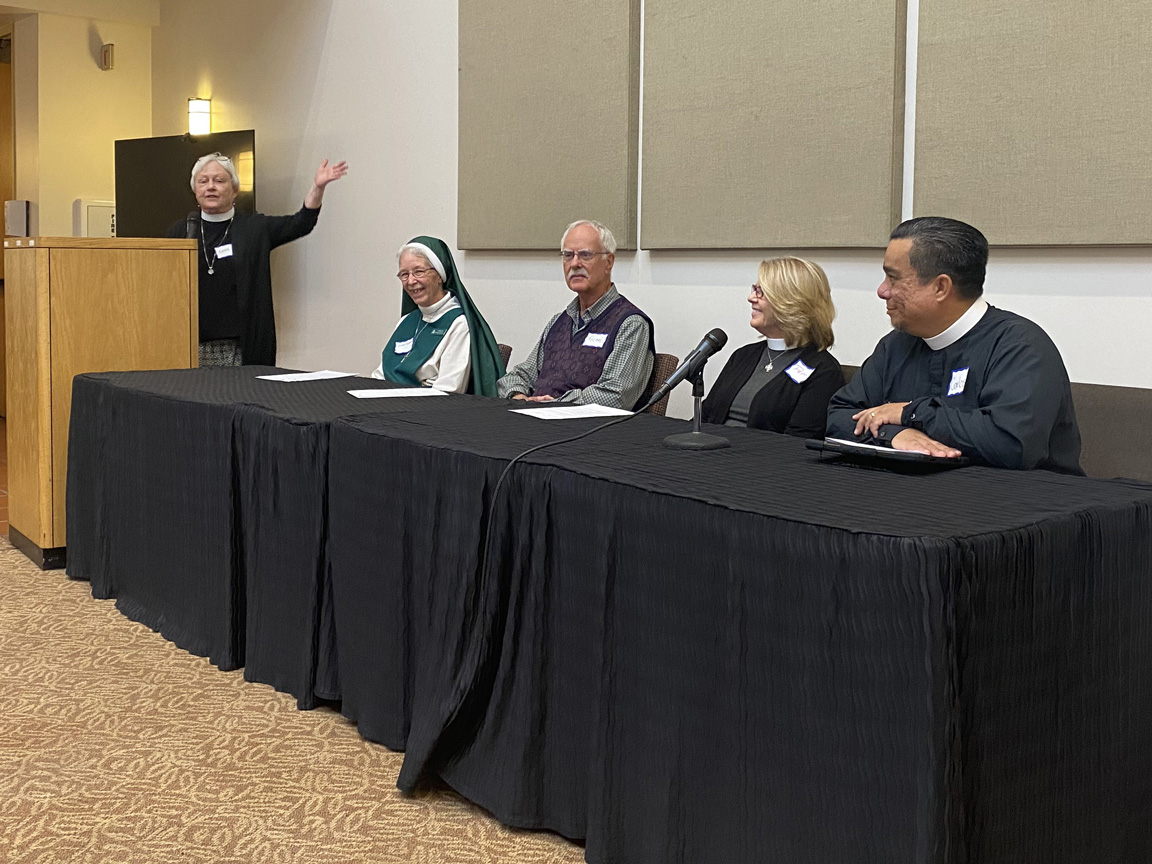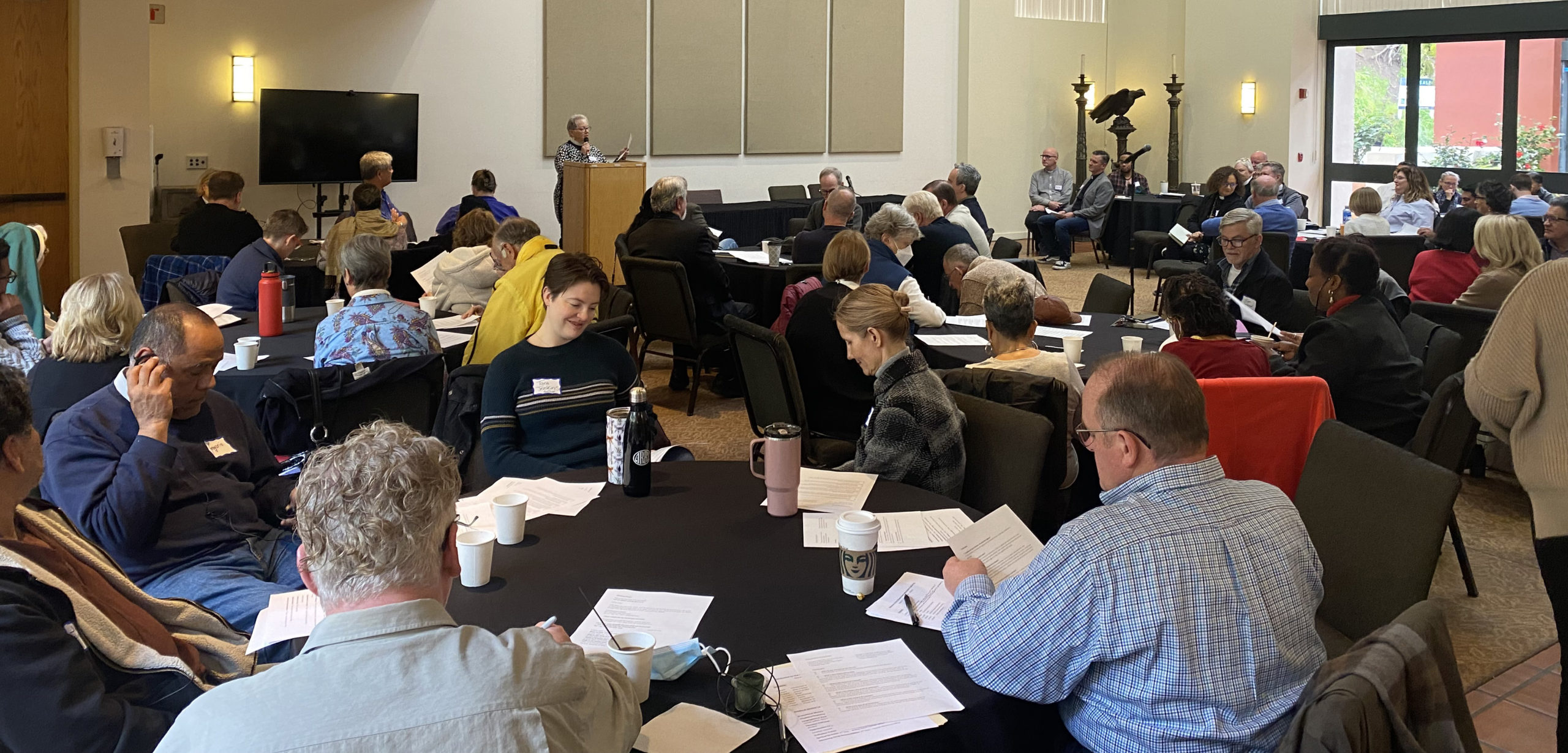
Panelists at the Discernment Information Gathering on March 4 listen as Archdeacon Laura Siriani talks about the ministry of deacons. Panelists, from left, are: Sister Susan of the Anamchara Fellowship; Ricardo Reznicek, lay leader at St. Cross Church, Hermosa Beach; Patti Angelo, deacon at St. Cross; and Carlos Ruvalcaba, assisting priest at St. Stephen’s, Hollywood, and St. Be’s, Eagle Rock. Photo: Keith Yamamoto
[The Episcopal News] If you think discernment merely involves a call to ordination in the Episcopal Diocese of Los Angeles, think again, Cameron Johnson, co-chair of the Commission on Ministry, told the first-ever Discernment Information Gathering, or “DIG,” on March 4 at St. Paul’s Commons.
“Most of you here today are probably asking for God’s guidance in your life,” Johnson told about 80 attendees, including those in discernment, members of church committees aiding discerners, and clergy. “God, through the gospels, is calling all of us to ministry and not just ordained ministry.”
Organized by the COM, the DIG brought together Episcopalians from across the diocese for a day of fellowship, information, education and even practice discernment exercises for those considering calls to the varying orders of ministry: laity, professed religious, diaconate and priest, and for those communities and clergy supporting them.
Participants could select from among such workshops in Spanish and English as bi-vocational ministry, chaplaincy, education pathways, opportunities for lay leaders, the ordination process, spiritual direction, and sponsoring-clergy responsibilities. Another workshop, about congregational discernment committee training, was led by Canon Jim White, who recently retired after 25 years’ service on the COM.
The Rev. Lyn Crow, a COM co-chair, recalled “the old days, [when] the way discernment happened is, somebody came to the diocese and the commission, and we said, ‘is this a priest or not – yes or no? The last number of years we’ve been shifting the focus of discernment and we’re proud of that, because we’re noticing that there’s more ministry going on than just in the priesthood.
“At the parish we’ll tell a person yes, you’re called. There’s no question that you’re called because we’re all called. The question is, what are you called to? Are you called to be a lay minister?”
The shift in focus has been a long time coming, said the Rev. Canon Susan Russell, amid a chorus of “Yeahs.” Russell is diocesan canon for Engagement Across Difference and an assisting priest at All Saints, Pasadena, where she oversees the discernment process currently for nine separate committees, she told The Episcopal News later.
“This is the beginning of that work for us as a diocese institutionally,” she said. “This is something many of us have been working toward for decades.”
The Commission on Ministry includes about 30 members, both lay and ordained, representing all orders of ministry – lay, diaconate, priesthood, and religious orders. Two members, one lay and one clergy, are elected at the annual diocesan convention; others are appointed by the bishop. The commission serves the diocese by walking with individuals as they discern their calling to deeper, and perhaps, ordained ministry.

The Discernment Information Gathering, or DIG, brought together Episcopalians interested in discerning calls to ministry, or helping others to do the same. Photo: Keith Yamamoto
No ‘cookie cutter’ approach to discernment
Discernment, “in the broadest sense, is about how you and I intentionally bring God into our process,” Ravi Verma of Stillpoint told participants. Stillpoint: The Center for Christian Spirituality, an institution of the diocese, offers workshops, retreats, spiritual direction, and training in spiritual direction.
“How do we listen for that still, small voice that guides us, pushes us, prods us, pulls us … which is another way of saying, how do you pray? And there is no cookie cutter way in which this happens. Each of us has our own style, our own way of doing this, based on our history, our background, our culture,” he said.
The process of discernment can take up to five years, and can feel confusing, and even scary, said the Rev. Carlos Ruvalcaba, assisting priest at St. Stephen’s, Hollywood, and St. Be’s, Eagle Rock, and a featured panelist at the gathering.
“The process is lengthy yet exciting and wonderful,” he said. He described feeling a call to ministry at age 12, and asking his grandmother to make him vestments, “because I wanted to replicate what I had seen the priest do in church.”
Formally entering the process of discernment, he said, “begins with a period of time for you to pray a lot and discern a lot, talking to your priest, forming a parochial discernment committee, talking to the bishop, to the COM, and the standing committee until we all saw together that this call is a genuine thing. And then you are made a postulant and sent to seminary.”
After formal education in seminary, “there are more interviews, for candidacy and, once a candidate, the General Ordination Exams. There are a lot of steps before you apply for ordination to the diaconate and, six months later, for the priesthood,” he said.
Sister Susan of the Anamchara Fellowship (https://anamcharafellowship.org/) also felt called at an early age to become a professed religious, a nun. She entered a traditional Episcopal Church religious order, “but discovered it wasn’t a good fit.” A spiritual director who serves in a pastoral capacity at St. Luke’s, Long Beach, she added, “… but my desire to be a religious sister never left.” She joined the Anamchara Fellowship 13 years ago “and I feel I’m in the right place.”
While a third-year Education for Ministry student, Ricardo Reznicek, although already heavily involved in lay ministries at St. Cross Church, Hermosa Beach, wanted to know “where am I supposed to be in this world with God,” he told the gathering.
After learning that the diocese then had a companion relationship with Belize, he traveled there and met with a priest from Guatemala who worked with refugees from neighboring countries’ civil wars. The priest drove him into the countryside to a site with four stakes driven into the ground and said, “This is the place I want you to help us build a church,” Reznicek recalled.
“I actually saw in his eyes as he told me that, that this was a message from God. I actually saw God, in his eyes, right at that moment. It was startling. I knew at that moment, that that was my call. I didn’t know how it would happen but there it was.” Later, he enlisted the aid of the community during “the first-ever altar call at St. Cross,” and about 90% of the congregation responded. The call is always there for everyone, he added, “but we have to be open to it.”
The Rev. Patti Angelo was also a member of that St. Cross EfM class and never thought about becoming a deacon, she said, until she was asked to consider it. Her discernment led her to clinical pastoral education, a chaplaincy training course usually required for ordination. That led to classes at Claremont School of Theology and to earning a master of divinity degree.
After her CST advisor, and then her priest asked if she’d ever thought about becoming a deacon, “I just learned to start saying yes,” Angelo said. “The next thing I know, they had whipped together a discernment committee, headed by Cameron Johnson, and a great group of people helped me walk through it. I thank God every day that someone asked me, why aren’t you a deacon?”
Being open to the process and to new possibilities is essential throughout discernment, which may be different at varying stages of life, Verma said.
For those attendees participating in congregational discernment committees, which meet with parishioners to help them listen for what God is calling them to do, “the challenge is to provide space for people to explore most deeply what is going on in their lives,” Verma said. “We really need to intentionally all come as grounded as we can in the Spirit, in God, [seeking] … what can we do to make that process more prayerful.”
Honoring cultural diversity, confidentiality, trust, curiosity, and compassion are also required, Verma continued: curiosity about what brought them to a sense of call and how they are listening to it, and compassion, because issues like race, sexuality, class, gender, “are present in the world and they will be present in our systems and processes.
“How do we stay open to people coming from different cultures, different backgrounds, different histories, different access to info – how do our systems adapt to that?”
Healing often happens for those supporting others through discernment, Verma noted. “As you and I keep listening to God, God shows us areas in our own lives that need healing. It’s up to all of us to support each other as we do that work.”
There are many ways, many opportunities to serve, regardless of the order of ministry, “and we are all called to take part in the work that God is already doing in this world,” Ruvalcaba said. “We all experience a sense of someone calling us to do something at some point in our lives.”
The process may feel challenging but “is worth all the effort and the education invested,” he said. “The life lessons learned and the meaning they give to your current life have no comparison. It shows me that nothing is impossible, and it never is too late when we decide to say yes to the call, the invitation from God. Together with God and God’s people we are called and invited to become the healers that our beautiful and broken world desperately needs.”
